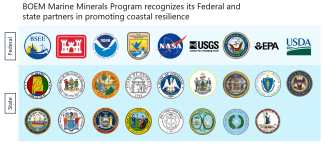Marine Minerals Program (MMP) partners with federal and state agencies, academic institutions, industry, and other organizations to maximize research, improve data collection, and facilitate the responsible use of marine mineral resources.
On This Page:
More about the Marine Minerals Program:
How We Partner with Federal, Regional, and State Entities and Organizations
The success of the MMP depends on partnerships with other federal agencies, state and local governments, organizations such as regional planning bodies, industry and the business community, academia, non-governmental organizations, tribes, and the public. The relationships we are building and fortifying with a wide range of stakeholders are helping to reach a new level of coastal resilience.
These partners are the main contributors of our research and data access through the Marine Mineral Information System (MMIS) Viewer. It is an interactive tool that uses over 30 years of BOEM-funded research and allows you to find marine minerals lease areas, core samples from multiple sources, sand sources, and more.
Partnership Categories
Academic Institutions
Industry
Scientific Organizations
Associations / Councils and Working Groups
Non-Profit Organizations
State & Local Agencies
Federal Agencies
Regional Partners
Tribes
Click to See Partner List
- Association of American State Geologists - BOEM-AASG Memorandum of Understanding
- Coastal Zone Management Councils formed under the Coastal Zone Management Act
State Geological Surveys, Departments of Natural Resources, Departments of Environmental Protection, coastal colleges or universities, and other partners in:
- Alabama - Geological Survey of Alabama
- Delaware - Delaware Office of Natural Resources and Environmental Control, Delaware Geological Survey/University of Delaware
- Florida - Florida Department of Environmental Protection, including the Florida Geological Survey/; University of Florida
- Georgia - University of Georgia, Skidaway Institute of Oceanography
- Louisiana — Louisiana Department of Natural Resources; LDNR/Office of Coastal Management; Coastal Protection and Restoration Authority, University of New Orleans; The Water Institute of the Gulf
- Maine - Department of Agriculture, Conservation and Forestry/Maine Coastal Program and Maine Geological Survey
- Maryland - Maryland Department of Natural Resources/Maryland Geological Survey
- Massachusetts - Commonwealth of Massachusetts/University of Massachusetts Amherst/Geosciences
- Mississippi - Mississippi Department of Marine Resources, University of Southern Mississippi
- New Hampshire - New Hampshire Center for Coastal and Ocean Mapping; Department of Environmental Services and the New Hampshire Geological Survey
- New Jersey - New Jersey Department of Environmental Protection and the New Jersey Geological and Water Survey
- New York - New York Department of State, Office of Planning and Development and Stony Brook University, Department of Geosciences
- North Carolina - East Carolina University; North Carolina Coastal Studies Institute; North Carolina Department of Environmental Quality, Division of Coastal Management
- Rhode Island - University of Rhode Island, Graduate School of Oceanography; Rhode Island Coastal Resources Management Council
- South Carolina - South Carolina Department of Natural Resources
- Texas - Texas General Land Office, University of Texas at Austin - BOEM-USACE-Texas GLO Memorandum of Understanding
Sand Management Working Groups (SMWG)
BOEM holds meetings several times a year with regional sand management working groups (SMWGs) to discuss coastal restoration issues, concerns, and challenges. The meetings allow for an exchange of information and perspectives, foster communication and coordination, and provide updates on funding opportunities, research efforts, and coastal projects. SMWG members represent state and federal agencies, researchers, non-governmental organizations, and other stakeholders.


